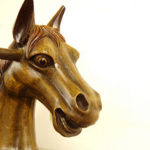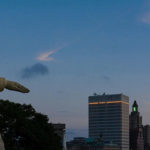Where were you?
Chances are, you recall exactly where you were and what you were doing the moment you knew nobody ever would forget Sept. 11, 2001. Unless you saw it for yourself and realized the size of the aircraft, maybe the first plane crash into the World Trade Center tower didn't sear itself into your memory. But then a second plane slammed into the other tower, and another rammed into the Pentagon, and a fourth plummeted into the Pennsylvania countryside. By late morning, the whole world knew terrorists burned "9/11" into eternal consciousness.
Still, we couldn't fathom the depth of all we witnessed, could we? That evening, Joanna and I kissed our girls goodnight, prayed for their safety and wondered what kind of world they inherited. We cried for the unspeakable grief borne by people who lost loved ones that fiery day. We prayed for the survivors, for New York City and Washington, and for our leaders. We agreed we had no idea what this meant and how our world would change. The enormity of the moment dwarfed our imaginations. Conversations like ours echoed in millions of homes that night.
Ten years later, we still struggle to comprehend what 9/11 means, don't we? On that sunny morning, explosions, flames and smoke altered our global landscape. We woke up in a seemingly structured world, where nations, militaries and economies exerted order and seemingly supplied safety. We went to bed in a chaotic world, where terrorism transcended borders and random violence destabilized peace. On that day, perversions of world religions (Islam vs. Christianity) replaced implementation of economic theories (communism vs. capitalism) as the political narrative of our era.
Since 9/11, much has changed. And little has changed.
If you don't think we live in a different world, fly somewhere. Or visit a government building. Or discuss where Muslims should be allowed to build their mosques. Or follow the news of the United States' longest war (Afghanistan) and a war of questionable origin (Iraq).
Positively, consider the increased respect we now afford firefighters, police and emergency medical providers. Think about how we've learned to remain vigilant, adapt to security measures and keep on keeping on. Unfortunately, many among us—some Baptists included—have at times regressed in their resolve to protect religious liberty for all people. Too often, we've failed to recognize terrorists do not represent Islam any better than Nazis, Klansmen and skinheads represent Christianity. Historically, you can understand why we have regressed, but regression remains a loss.
Despite all this, much about our world has changed very little. Even in the shadow of the 9/11 anniversary, Americans' primary concerns are economic—the country's debt, jobs, house prices, the stock market and affordable health care. Terrorism affects those core issues only indirectly. Day to day, we care about raising and educating children, going to work, planning for retirement, replacing bum knees and repairing clogged arteries, living in safe communities and driving on good roads.
Fortunately, spiritual realities remain as true today as they were on 9/11:
Sign up for our weekly edition and get all our headlines in your inbox on Thursdays
• Only God can save us. The Sept. 11 terrorists attacked two repositories of American faith—money and military. The Twin Towers, symbols of economic stability, crashed, and a gaping gash ripped through the heart of the Pentagon, seat of armed strength. Neither withstood the onslaught of evil.
The psalmist reminds us where to place our trust: "God is our refuge and strength, an ever-present help in trouble. Therefore, we will not fear, though the earth give way and the mountains fall into the sea, though its waters roar and foam, and the mountains quake with their surging" (Psalm 46:1-2).
• God suffers with us. Jesus, fully divine, took on human flesh and identified completely with us. He feels every pain and comprehends every fear. When terror strikes and uncertainty dominates, he understands. He grieves with us.
• Love defeats fear. If we wish to live without fear, we must love even our enemies. This is a hard, but true, lesson. We must not view all who appear similar to terrorists as terrorists themselves. Extremists in any world religion do not represent the beliefs of millions who wear the same religious label. We must not treat them as terrorists treated us. Love, not hate, is our weapon of choice in a war of fear.
The Apostle John said it best: "There is no fear in love. But perfect love drives out fear …" (1 John 4:18).
—Marv Knox is editor of the Baptist Standard. Visit his blog at www.baptiststandard.com.














We seek to connect God’s story and God’s people around the world. To learn more about God’s story, click here.
Send comments and feedback to Eric Black, our editor. For comments to be published, please specify “letter to the editor.” Maximum length for publication is 300 words.